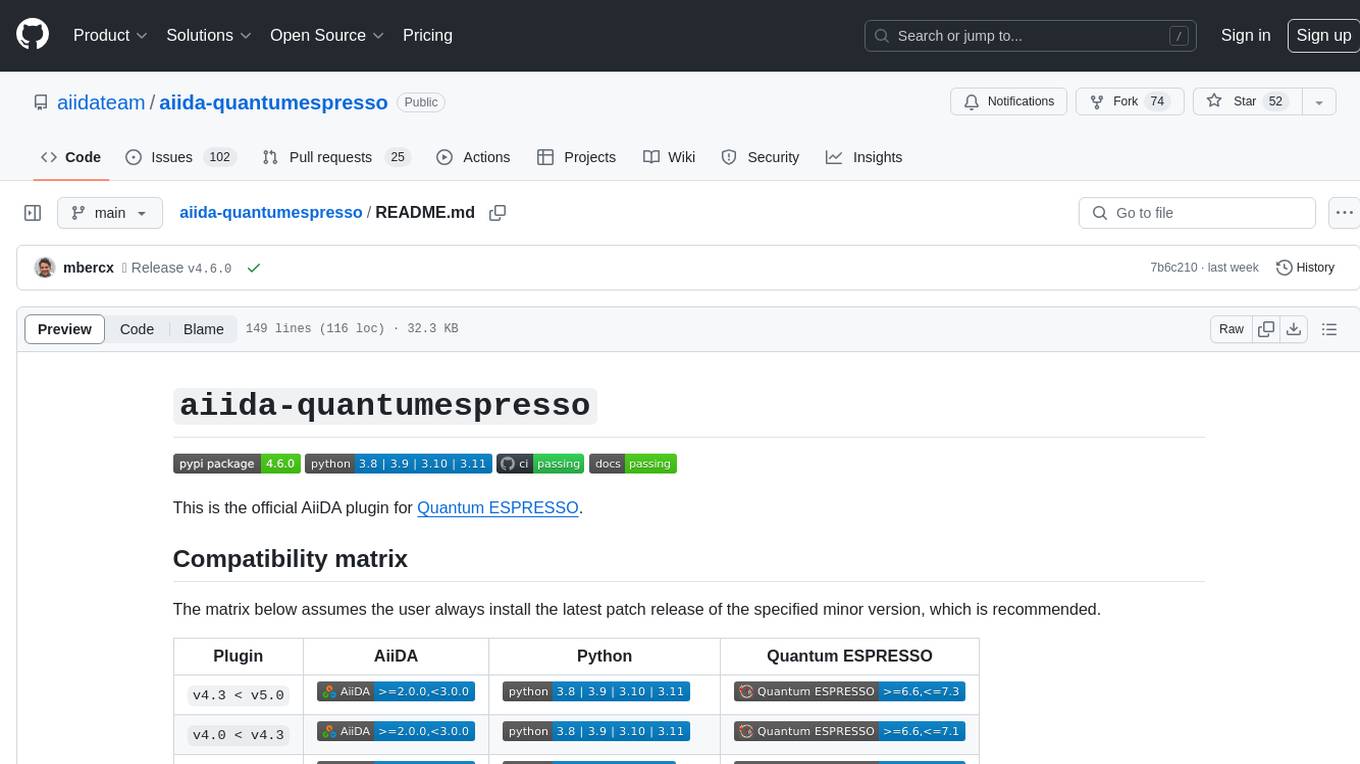
mnn-llm
llm deploy project based mnn. This project has merged into MNN.
Stars: 1520
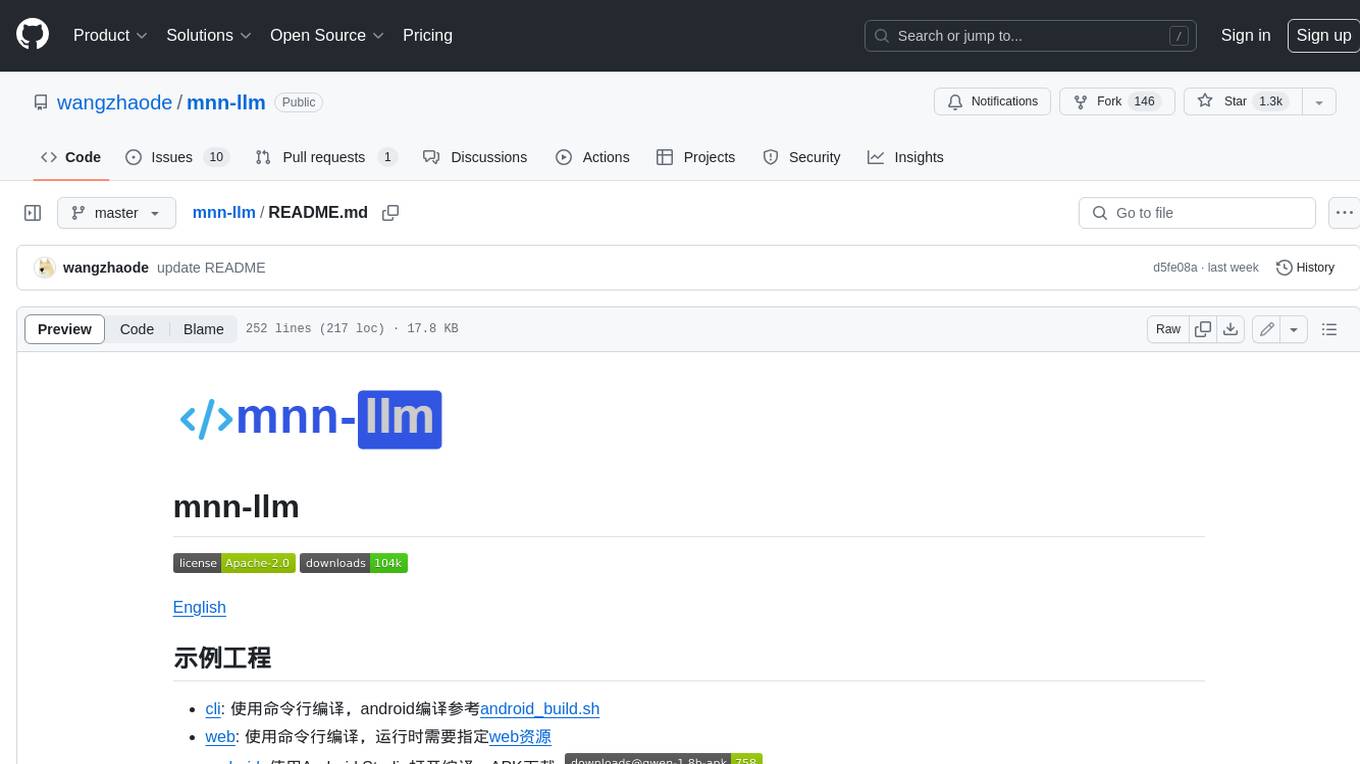
MNN-LLM is a high-performance inference engine for large language models (LLMs) on mobile and embedded devices. It provides optimized implementations of popular LLM models, such as ChatGPT, BLOOM, and GPT-3, enabling developers to easily integrate these models into their applications. MNN-LLM is designed to be efficient and lightweight, making it suitable for resource-constrained devices. It supports various deployment options, including mobile apps, web applications, and embedded systems. With MNN-LLM, developers can leverage the power of LLMs to enhance their applications with natural language processing capabilities, such as text generation, question answering, and dialogue generation.
README:
该项目代码已经Merge到MNN.
- cli: 使用命令行编译,android编译参考android_build.sh
- web: 使用命令行编译,运行时需要指定web资源
- android: 使用Android Studio打开编译;
- ios: 使用Xcode打开编译;🚀🚀🚀该示例代码100%由ChatGPT生成🚀🚀🚀
-
python: 对mnn-llm的python封装
mnnllm; - other: 新增文本embedding;
llm模型导出onnx和mnn模型请使用llm-export
CI构建状态:
# clone
git clone --recurse-submodules https://github.com/wangzhaode/mnn-llm.git
cd mnn-llm
# linux
./script/build.sh
# macos
./script/build.sh
# windows msvc
./script/build.ps1
# python wheel
./script/py_build.sh
# android
./script/android_build.sh
# android apk
./script/android_app_build.sh
# ios
./script/ios_build.sh
一些编译宏:
-
BUILD_FOR_ANDROID: 编译到Android设备; -
LLM_SUPPORT_VISION: 是否支持视觉处理能力; -
DUMP_PROFILE_INFO: 每次对话后dump出性能数据到命令行中;
默认使用CPU,如果使用其他后端或能力,可以在编译MNN时添加MNN编译宏
- cuda:
-DMNN_CUDA=ON - opencl:
-DMNN_OPENCL=ON - metal:
-DMNN_METAL=ON
# linux/macos
./cli_demo ./Qwen2-1.5B-Instruct-MNN/config.json # cli demo
./web_demo ./Qwen2-1.5B-Instruct-MNN/config.json ../web # web ui demo
# windows
.\Debug\cli_demo.exe ./Qwen2-1.5B-Instruct-MNN/config.json
.\Debug\web_demo.exe ./Qwen2-1.5B-Instruct-MNN/config.json ../web
# android
adb push android_build/MNN/OFF/arm64-v8a/libMNN.so /data/local/tmp
adb push android_build/MNN/express/OFF/arm64-v8a/libMNN_Express.so /data/local/tmp
adb push android_build/libllm.so android_build/cli_demo /data/local/tmp
adb push Qwen2-1.5B-Instruct-MNN /data/local/tmp
adb shell "cd /data/local/tmp && export LD_LIBRARY_PATH=. && ./cli_demo ./Qwen2-1.5B-Instruct-MNN/config.json"reference
- cpp-httplib
- chatgpt-web
- ChatViewDemo
- nlohmann/json
- Qwen-1.8B-Chat
- Qwen-7B-Chat
- Qwen-VL-Chat
- Qwen1.5-0.5B-Chat
- Qwen1.5-1.8B-Chat
- Qwen1.5-4B-Chat
- Qwen1.5-7B-Chat
- Qwen2-0.5B-Instruct
- Qwen2-1.5B-Instruct
- Qwen2-7B-Instruct
- Qwen2-VL-2B-Instruct
- Qwen2-VL-7B-Instruct
- Qwen2.5-0.5B-Instruct
- Qwen2.5-1.5B-Instruct
- Qwen2.5-3B-Instruct
- Qwen2.5-7B-Instruct
- Qwen2.5-Coder-1.5B-Instruct
- Qwen2.5-Coder-7B-Instruct
- Qwen2.5-Math-1.5B-Instruct
- Qwen2.5-Math-7B-Instruct
- chatglm-6b
- chatglm2-6b
- codegeex2-6b
- chatglm3-6b
- glm4-9b-chat
- Llama-2-7b-chat-ms
- Llama-3-8B-Instruct
- Llama-3.2-1B-Instruct
- Llama-3.2-3B-Instruct
- Baichuan2-7B-Chat
- internlm-chat-7b
- Yi-6B-Chat
- deepseek-llm-7b-chat
- TinyLlama-1.1B-Chat-v0.6
- phi-2
- bge-large-zh
- gte_sentence-embedding_multilingual-base
For Tasks:
Click tags to check more tools for each tasksFor Jobs:
Alternative AI tools for mnn-llm
Similar Open Source Tools

mnn-llm
MNN-LLM is a high-performance inference engine for large language models (LLMs) on mobile and embedded devices. It provides optimized implementations of popular LLM models, such as ChatGPT, BLOOM, and GPT-3, enabling developers to easily integrate these models into their applications. MNN-LLM is designed to be efficient and lightweight, making it suitable for resource-constrained devices. It supports various deployment options, including mobile apps, web applications, and embedded systems. With MNN-LLM, developers can leverage the power of LLMs to enhance their applications with natural language processing capabilities, such as text generation, question answering, and dialogue generation.
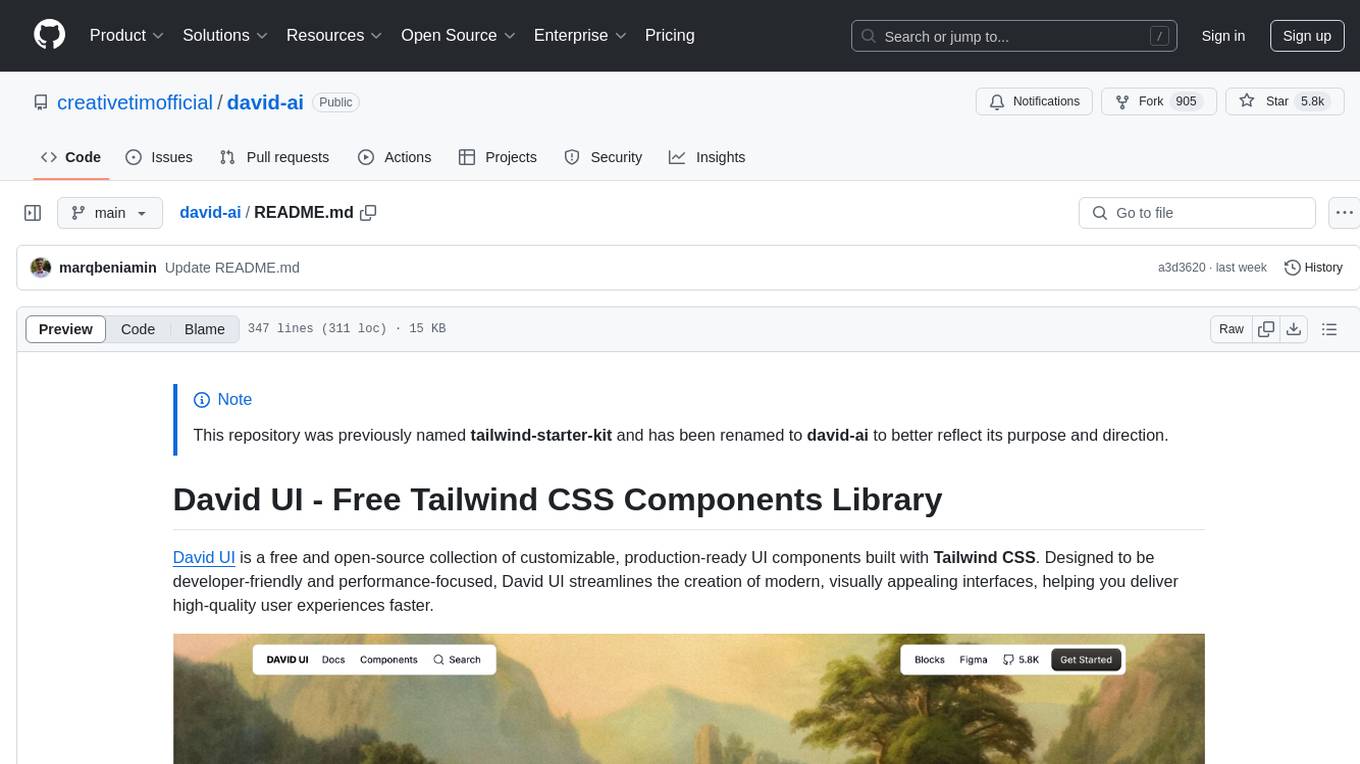
david-ai
David UI is a free and open-source collection of customizable, production-ready UI components built with Tailwind CSS. It is designed to be developer-friendly and performance-focused, streamlining the creation of modern, visually appealing interfaces to help deliver high-quality user experiences faster.
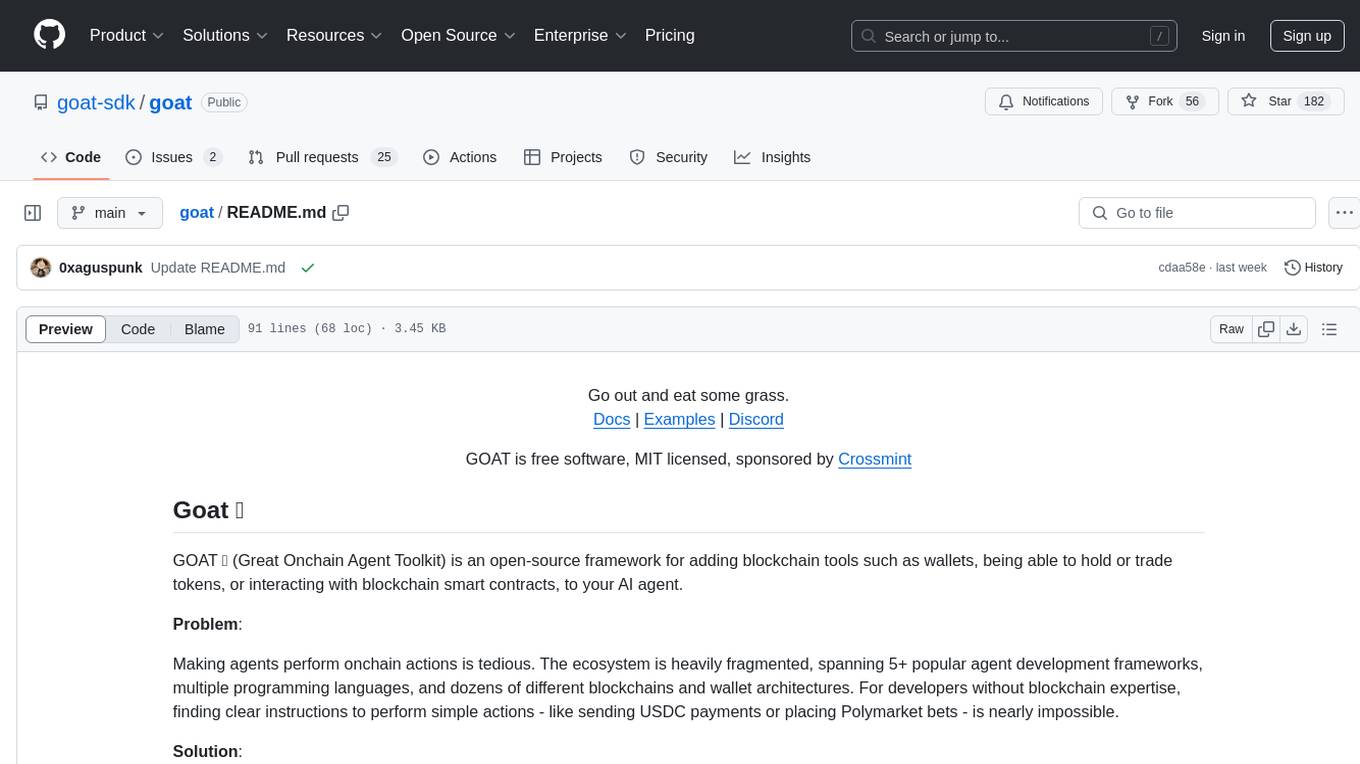
goat
GOAT (Great Onchain Agent Toolkit) is an open-source framework designed to simplify the process of making AI agents perform onchain actions by providing a provider-agnostic solution that abstracts away the complexities of interacting with blockchain tools such as wallets, token trading, and smart contracts. It offers a catalog of ready-made blockchain actions for agent developers and allows dApp/smart contract developers to develop plugins for easy access by agents. With compatibility across popular agent frameworks, support for multiple blockchains and wallet providers, and customizable onchain functionalities, GOAT aims to streamline the integration of blockchain capabilities into AI agents.
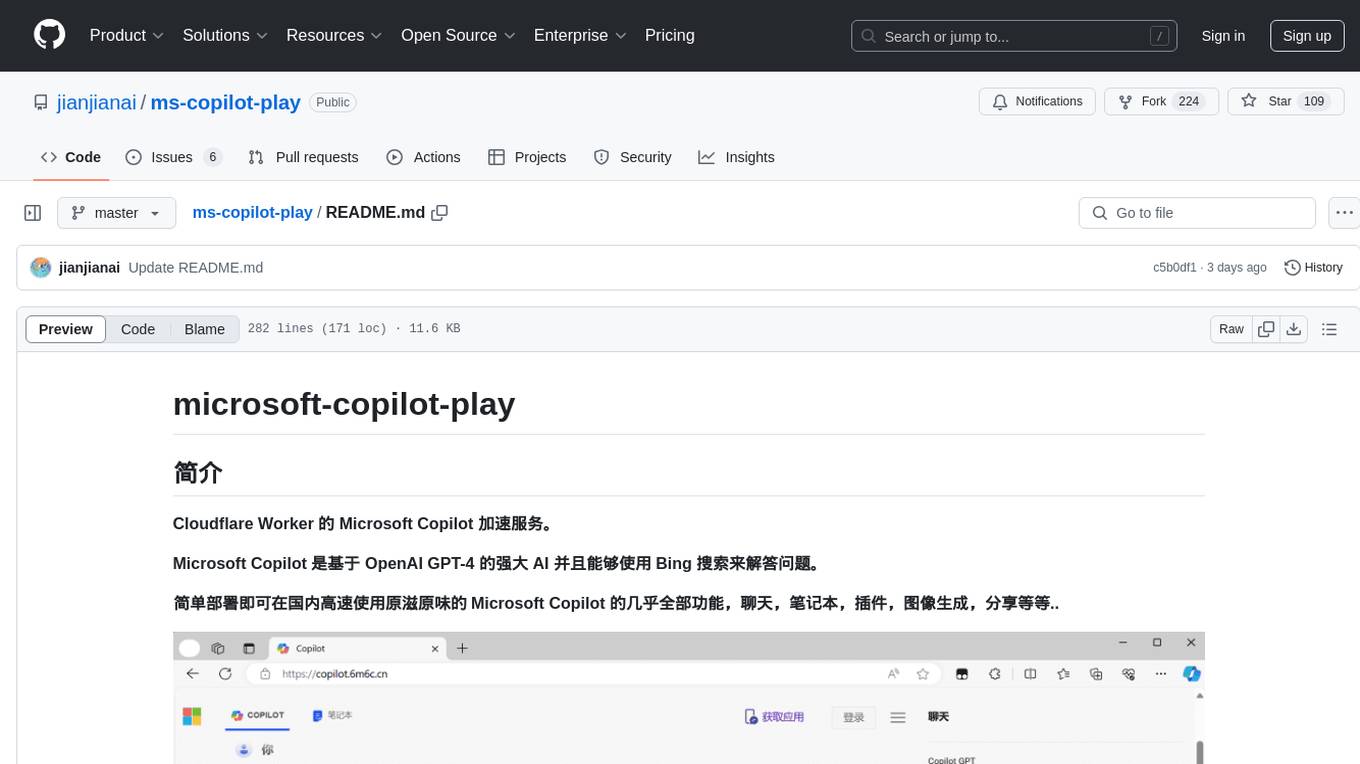
ms-copilot-play
Microsoft Copilot Play is a Cloudflare Worker service that accelerates Microsoft Copilot functionalities in China. It allows high-speed access to Microsoft Copilot features like chatting, notebook, plugins, image generation, and sharing. The service filters out meaningless requests used for statistics, saving up to 80% of Cloudflare Worker requests. Users can deploy the service easily with Cloudflare Worker, ensuring fast and unlimited access with no additional operations. The service leverages the power of Microsoft Copilot, based on OpenAI GPT-4, and utilizes Bing search to answer questions.
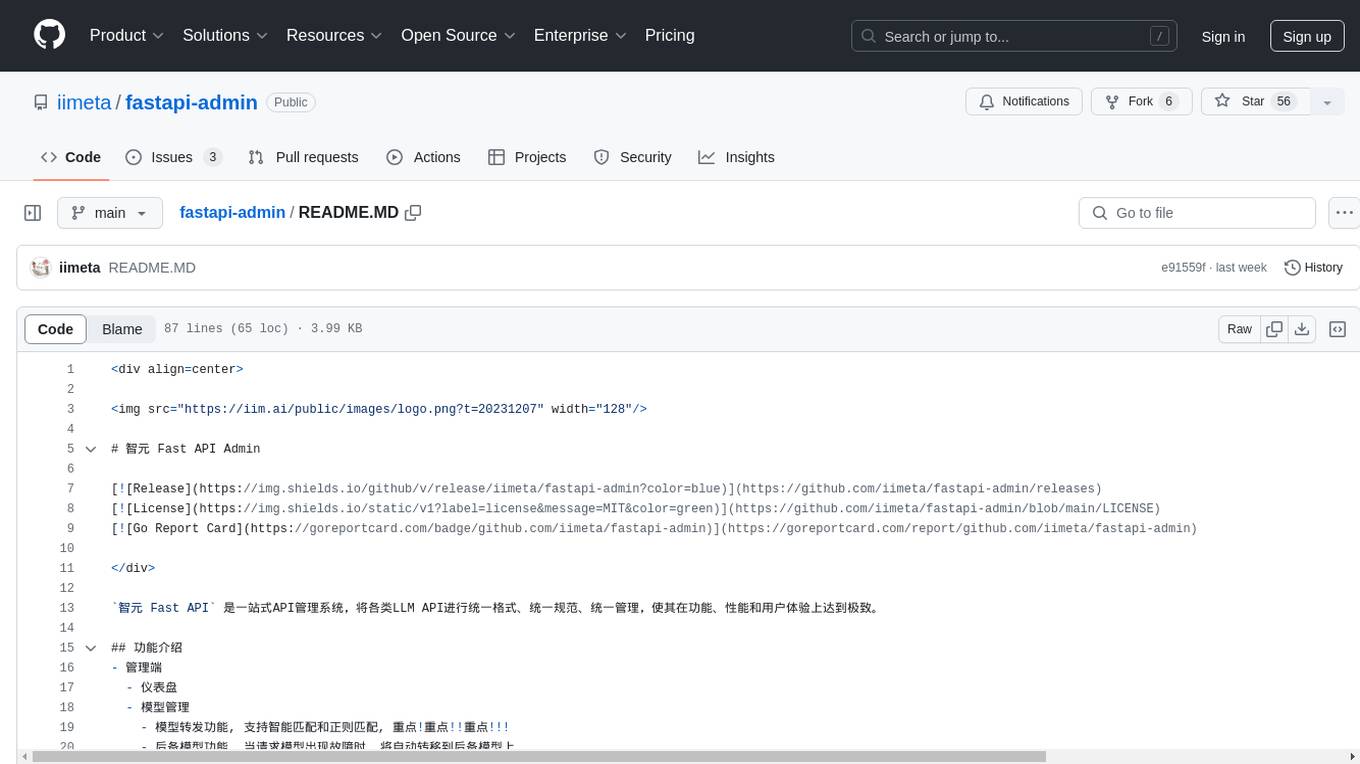
fastapi-admin
智元 Fast API is a one-stop API management system that unifies various LLM APIs in terms of format, standards, and management to achieve the ultimate in functionality, performance, and user experience. It includes features such as model management with intelligent and regex matching, backup model functionality, key management, proxy management, company management, user management, and chat management for both admin and user ends. The project supports cluster deployment, multi-site deployment, and cross-region deployment. It also provides a public API site for registration with a contact to the author for a 10 million quota. The tool offers a comprehensive dashboard, model management, application management, key management, and chat management functionalities for users.
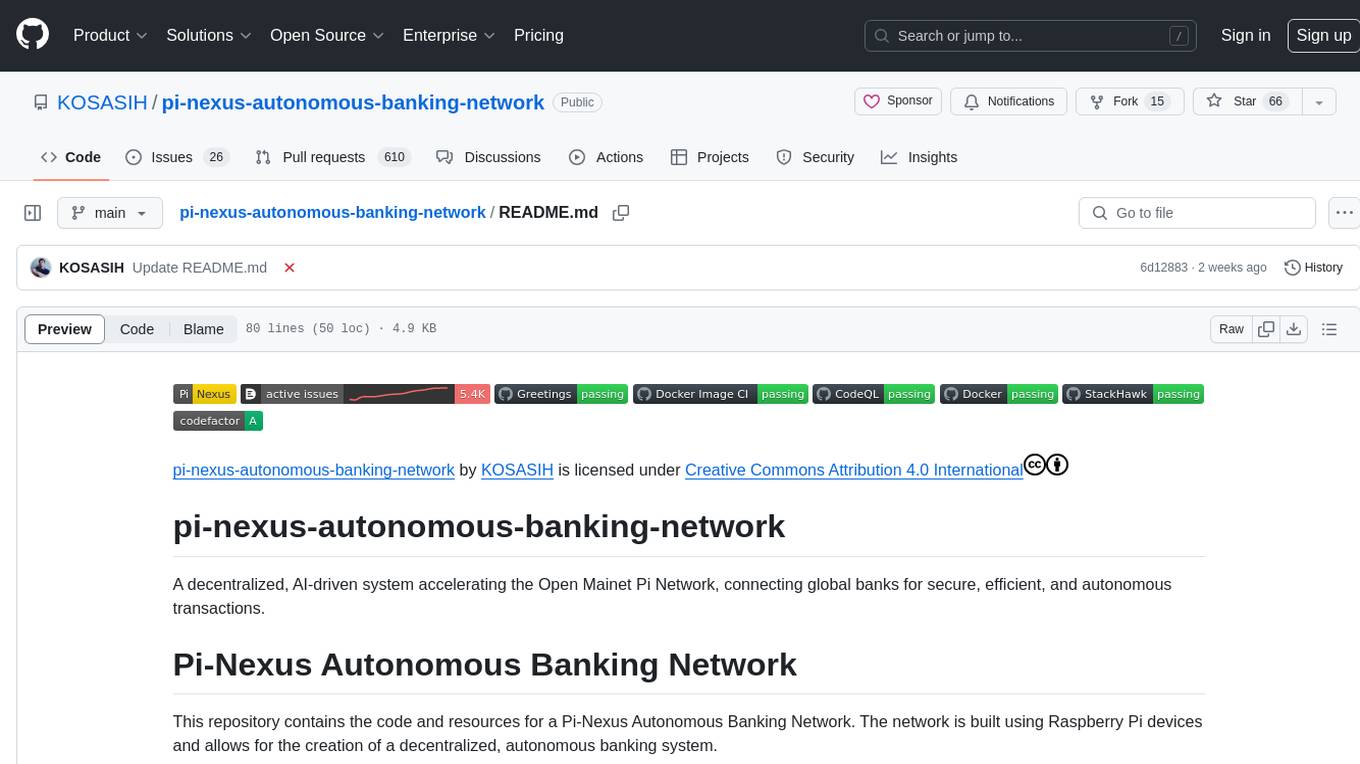
pi-nexus-autonomous-banking-network
A decentralized, AI-driven system accelerating the Open Mainet Pi Network, connecting global banks for secure, efficient, and autonomous transactions. The Pi-Nexus Autonomous Banking Network is built using Raspberry Pi devices and allows for the creation of a decentralized, autonomous banking system.
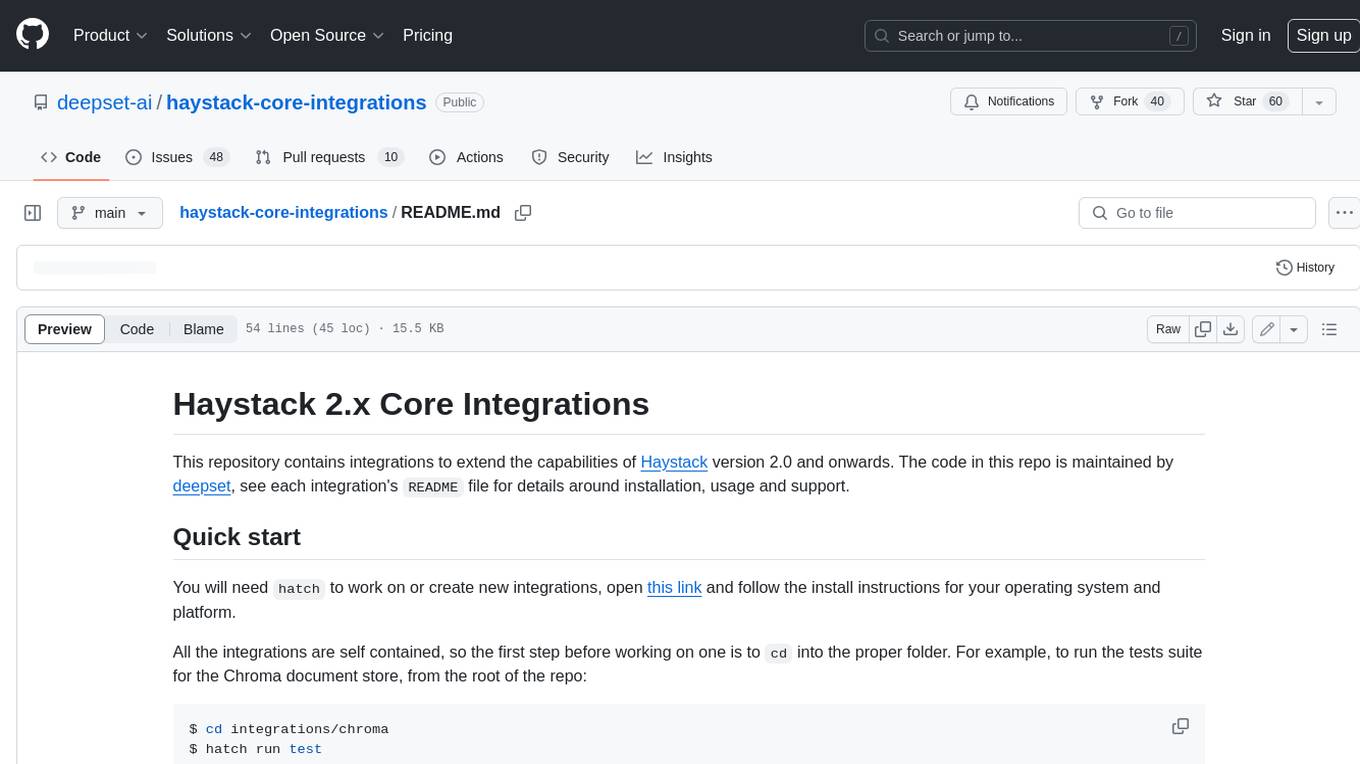
haystack-core-integrations
This repository contains integrations to extend the capabilities of Haystack version 2.0 and onwards. The code in this repo is maintained by deepset, see each integration's `README` file for details around installation, usage and support.
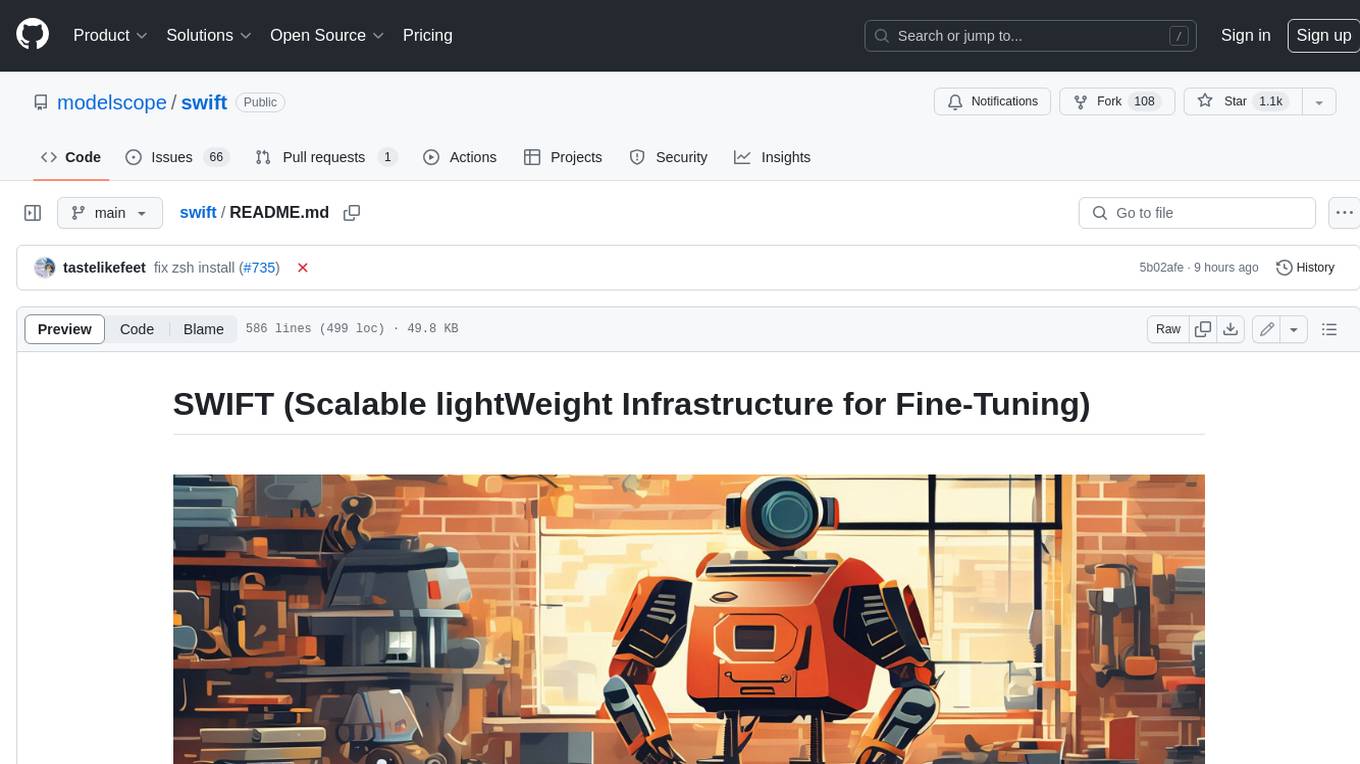
swift
SWIFT (Scalable lightWeight Infrastructure for Fine-Tuning) supports training, inference, evaluation and deployment of nearly **200 LLMs and MLLMs** (multimodal large models). Developers can directly apply our framework to their own research and production environments to realize the complete workflow from model training and evaluation to application. In addition to supporting the lightweight training solutions provided by [PEFT](https://github.com/huggingface/peft), we also provide a complete **Adapters library** to support the latest training techniques such as NEFTune, LoRA+, LLaMA-PRO, etc. This adapter library can be used directly in your own custom workflow without our training scripts. To facilitate use by users unfamiliar with deep learning, we provide a Gradio web-ui for controlling training and inference, as well as accompanying deep learning courses and best practices for beginners. Additionally, we are expanding capabilities for other modalities. Currently, we support full-parameter training and LoRA training for AnimateDiff.

intel-extension-for-transformers
Intel® Extension for Transformers is an innovative toolkit designed to accelerate GenAI/LLM everywhere with the optimal performance of Transformer-based models on various Intel platforms, including Intel Gaudi2, Intel CPU, and Intel GPU. The toolkit provides the below key features and examples: * Seamless user experience of model compressions on Transformer-based models by extending [Hugging Face transformers](https://github.com/huggingface/transformers) APIs and leveraging [Intel® Neural Compressor](https://github.com/intel/neural-compressor) * Advanced software optimizations and unique compression-aware runtime (released with NeurIPS 2022's paper [Fast Distilbert on CPUs](https://arxiv.org/abs/2211.07715) and [QuaLA-MiniLM: a Quantized Length Adaptive MiniLM](https://arxiv.org/abs/2210.17114), and NeurIPS 2021's paper [Prune Once for All: Sparse Pre-Trained Language Models](https://arxiv.org/abs/2111.05754)) * Optimized Transformer-based model packages such as [Stable Diffusion](examples/huggingface/pytorch/text-to-image/deployment/stable_diffusion), [GPT-J-6B](examples/huggingface/pytorch/text-generation/deployment), [GPT-NEOX](examples/huggingface/pytorch/language-modeling/quantization#2-validated-model-list), [BLOOM-176B](examples/huggingface/pytorch/language-modeling/inference#BLOOM-176B), [T5](examples/huggingface/pytorch/summarization/quantization#2-validated-model-list), [Flan-T5](examples/huggingface/pytorch/summarization/quantization#2-validated-model-list), and end-to-end workflows such as [SetFit-based text classification](docs/tutorials/pytorch/text-classification/SetFit_model_compression_AGNews.ipynb) and [document level sentiment analysis (DLSA)](workflows/dlsa) * [NeuralChat](intel_extension_for_transformers/neural_chat), a customizable chatbot framework to create your own chatbot within minutes by leveraging a rich set of [plugins](https://github.com/intel/intel-extension-for-transformers/blob/main/intel_extension_for_transformers/neural_chat/docs/advanced_features.md) such as [Knowledge Retrieval](./intel_extension_for_transformers/neural_chat/pipeline/plugins/retrieval/README.md), [Speech Interaction](./intel_extension_for_transformers/neural_chat/pipeline/plugins/audio/README.md), [Query Caching](./intel_extension_for_transformers/neural_chat/pipeline/plugins/caching/README.md), and [Security Guardrail](./intel_extension_for_transformers/neural_chat/pipeline/plugins/security/README.md). This framework supports Intel Gaudi2/CPU/GPU. * [Inference](https://github.com/intel/neural-speed/tree/main) of Large Language Model (LLM) in pure C/C++ with weight-only quantization kernels for Intel CPU and Intel GPU (TBD), supporting [GPT-NEOX](https://github.com/intel/neural-speed/tree/main/neural_speed/models/gptneox), [LLAMA](https://github.com/intel/neural-speed/tree/main/neural_speed/models/llama), [MPT](https://github.com/intel/neural-speed/tree/main/neural_speed/models/mpt), [FALCON](https://github.com/intel/neural-speed/tree/main/neural_speed/models/falcon), [BLOOM-7B](https://github.com/intel/neural-speed/tree/main/neural_speed/models/bloom), [OPT](https://github.com/intel/neural-speed/tree/main/neural_speed/models/opt), [ChatGLM2-6B](https://github.com/intel/neural-speed/tree/main/neural_speed/models/chatglm), [GPT-J-6B](https://github.com/intel/neural-speed/tree/main/neural_speed/models/gptj), and [Dolly-v2-3B](https://github.com/intel/neural-speed/tree/main/neural_speed/models/gptneox). Support AMX, VNNI, AVX512F and AVX2 instruction set. We've boosted the performance of Intel CPUs, with a particular focus on the 4th generation Intel Xeon Scalable processor, codenamed [Sapphire Rapids](https://www.intel.com/content/www/us/en/products/docs/processors/xeon-accelerated/4th-gen-xeon-scalable-processors.html).
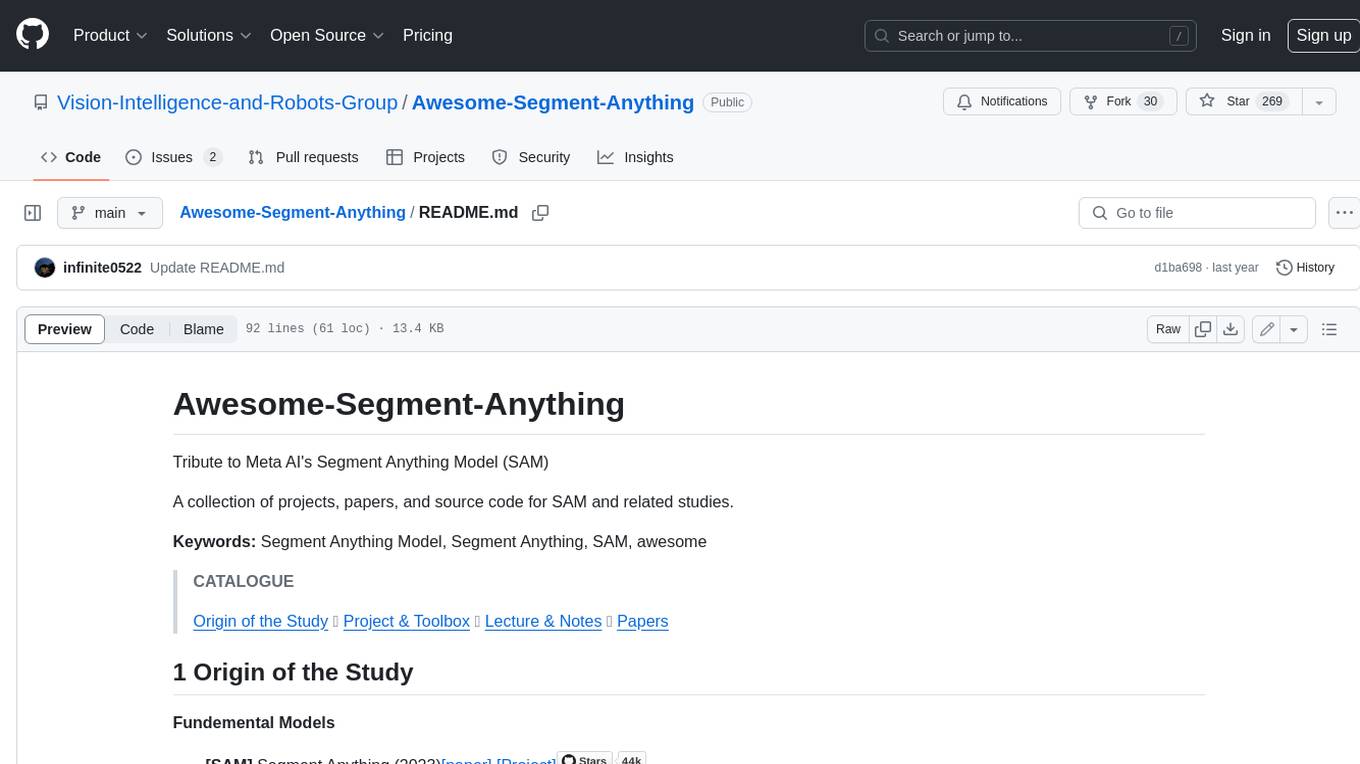
Awesome-Segment-Anything
The Segment Anything Model (SAM) is a powerful tool that allows users to segment any object in an image with just a few clicks. This makes it a great tool for a variety of tasks, such as object detection, tracking, and editing. SAM is also very easy to use, making it a great option for both beginners and experienced users.
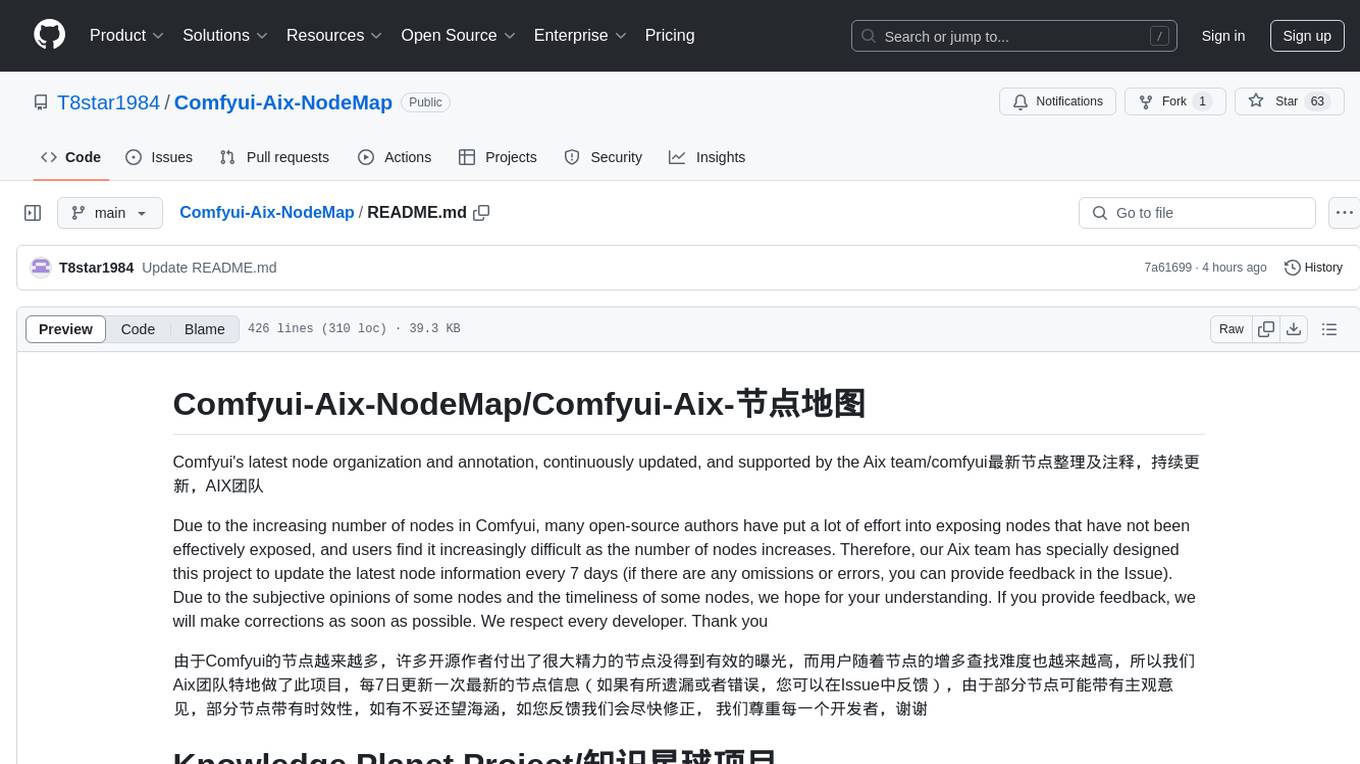
Comfyui-Aix-NodeMap
Comfyui-Aix-NodeMap is a project by the Aix team to organize and annotate the latest nodes in Comfyui. It aims to address the challenge of finding nodes effectively as their number increases. The project is continuously updated every 7 days, with the opportunity for users to provide feedback on any omissions or errors. The team respects developers' opinions and strives to make corrections promptly. The project is part of Aix's vision to make humanity more efficient through open-source contributions, including daily updates on workflow, AI information, and node introductions.

AiTreasureBox
AiTreasureBox is a versatile AI tool that provides a collection of pre-trained models and algorithms for various machine learning tasks. It simplifies the process of implementing AI solutions by offering ready-to-use components that can be easily integrated into projects. With AiTreasureBox, users can quickly prototype and deploy AI applications without the need for extensive knowledge in machine learning or deep learning. The tool covers a wide range of tasks such as image classification, text generation, sentiment analysis, object detection, and more. It is designed to be user-friendly and accessible to both beginners and experienced developers, making AI development more efficient and accessible to a wider audience.
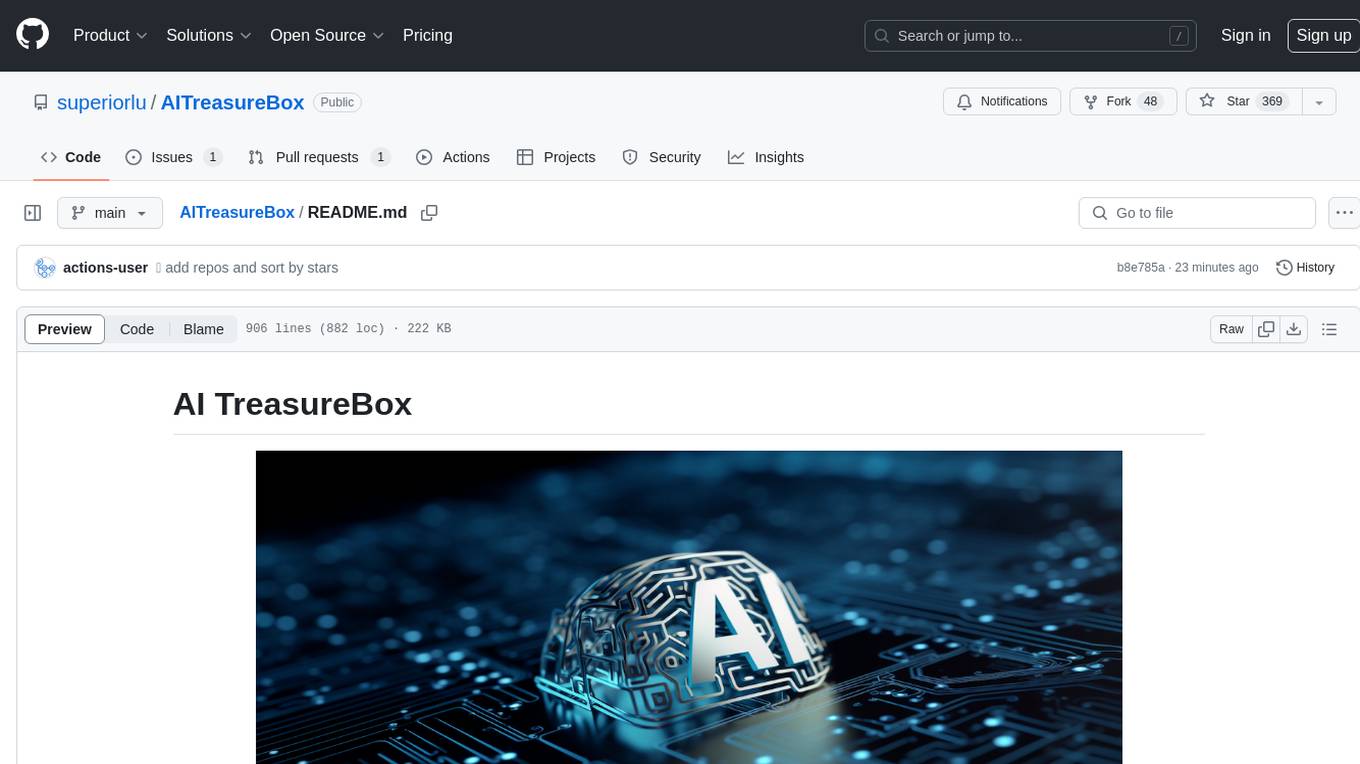
AITreasureBox
AITreasureBox is a comprehensive collection of AI tools and resources designed to simplify and accelerate the development of AI projects. It provides a wide range of pre-trained models, datasets, and utilities that can be easily integrated into various AI applications. With AITreasureBox, developers can quickly prototype, test, and deploy AI solutions without having to build everything from scratch. Whether you are working on computer vision, natural language processing, or reinforcement learning projects, AITreasureBox has something to offer for everyone. The repository is regularly updated with new tools and resources to keep up with the latest advancements in the field of artificial intelligence.
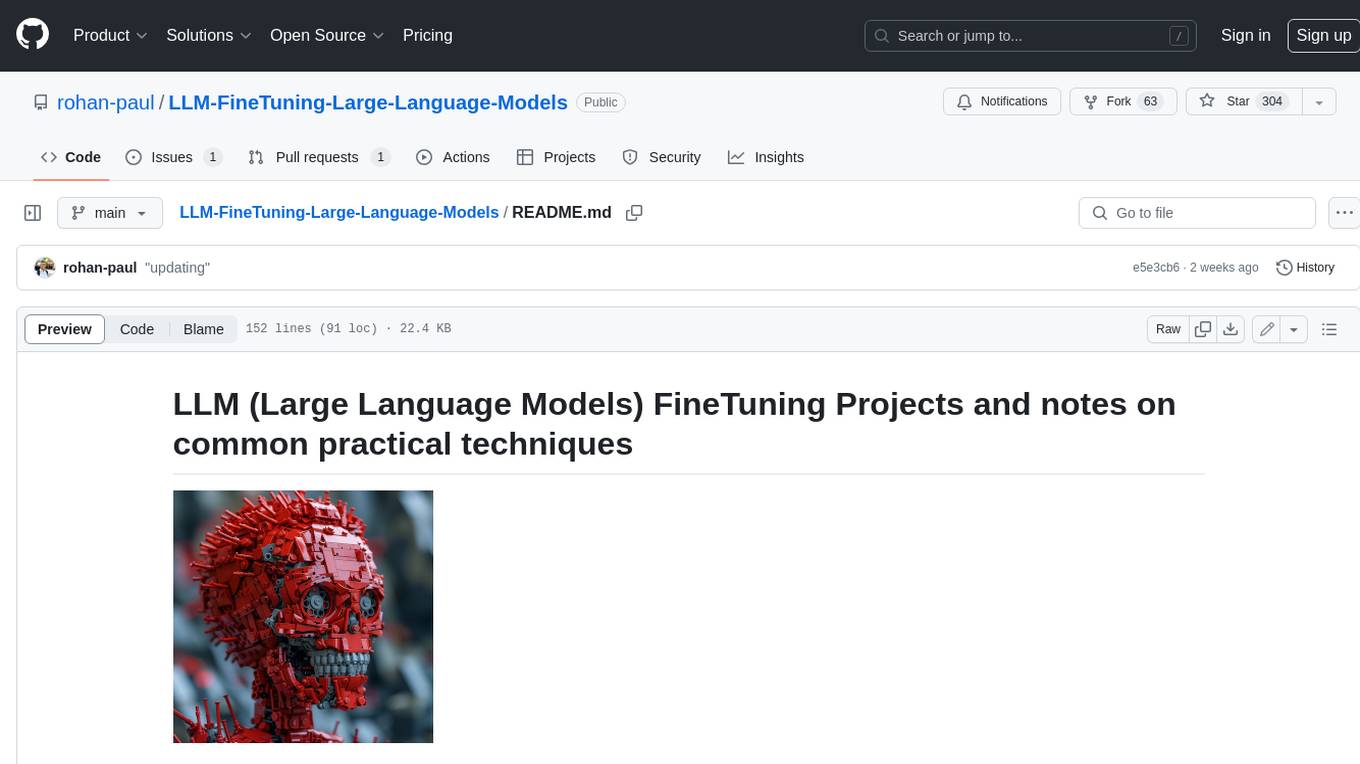
LLM-FineTuning-Large-Language-Models
This repository contains projects and notes on common practical techniques for fine-tuning Large Language Models (LLMs). It includes fine-tuning LLM notebooks, Colab links, LLM techniques and utils, and other smaller language models. The repository also provides links to YouTube videos explaining the concepts and techniques discussed in the notebooks.
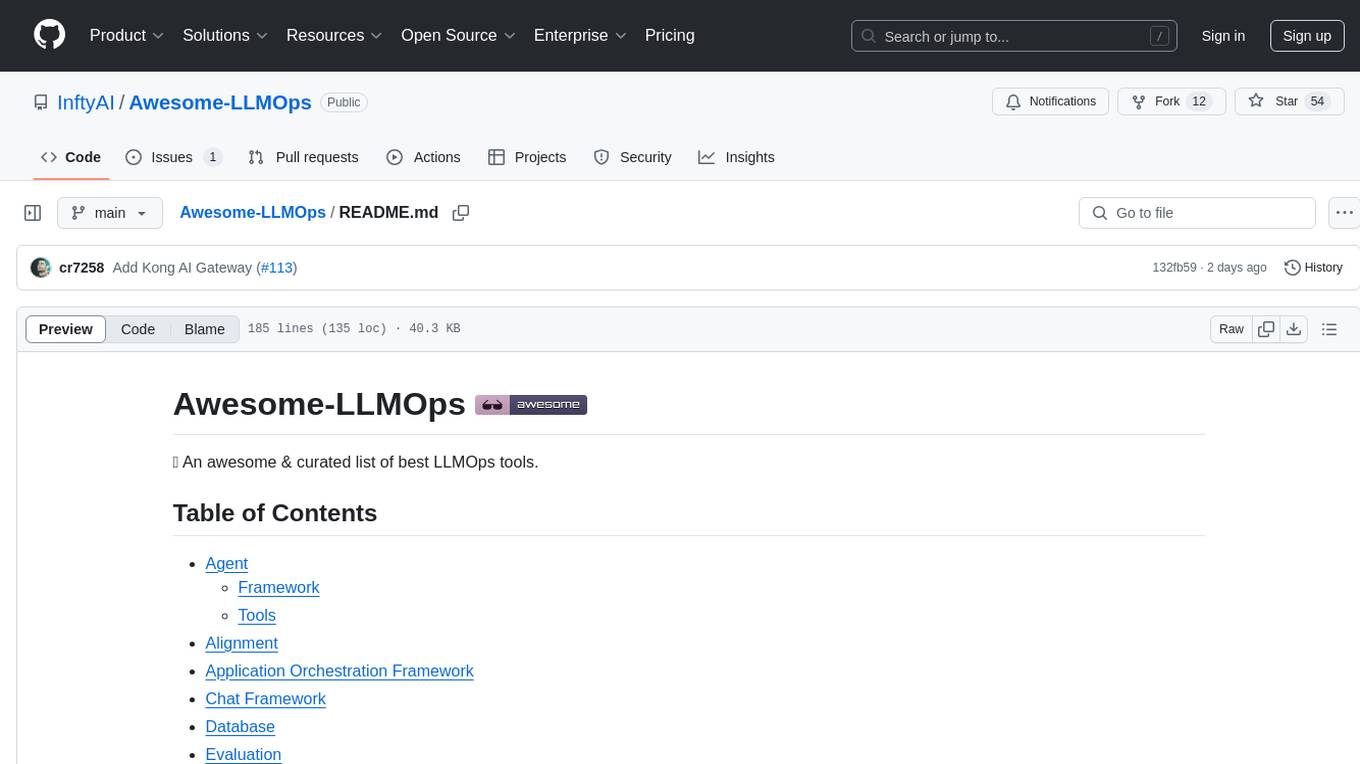
Awesome-LLMOps
Awesome-LLMOps is a curated list of the best LLMOps tools, providing a comprehensive collection of frameworks and tools for building, deploying, and managing large language models (LLMs) and AI agents. The repository includes a wide range of tools for tasks such as building multimodal AI agents, fine-tuning models, orchestrating applications, evaluating models, and serving models for inference. It covers various aspects of the machine learning operations (MLOps) lifecycle, from training to deployment and observability. The tools listed in this repository cater to the needs of developers, data scientists, and machine learning engineers working with large language models and AI applications.
For similar tasks

mnn-llm
MNN-LLM is a high-performance inference engine for large language models (LLMs) on mobile and embedded devices. It provides optimized implementations of popular LLM models, such as ChatGPT, BLOOM, and GPT-3, enabling developers to easily integrate these models into their applications. MNN-LLM is designed to be efficient and lightweight, making it suitable for resource-constrained devices. It supports various deployment options, including mobile apps, web applications, and embedded systems. With MNN-LLM, developers can leverage the power of LLMs to enhance their applications with natural language processing capabilities, such as text generation, question answering, and dialogue generation.
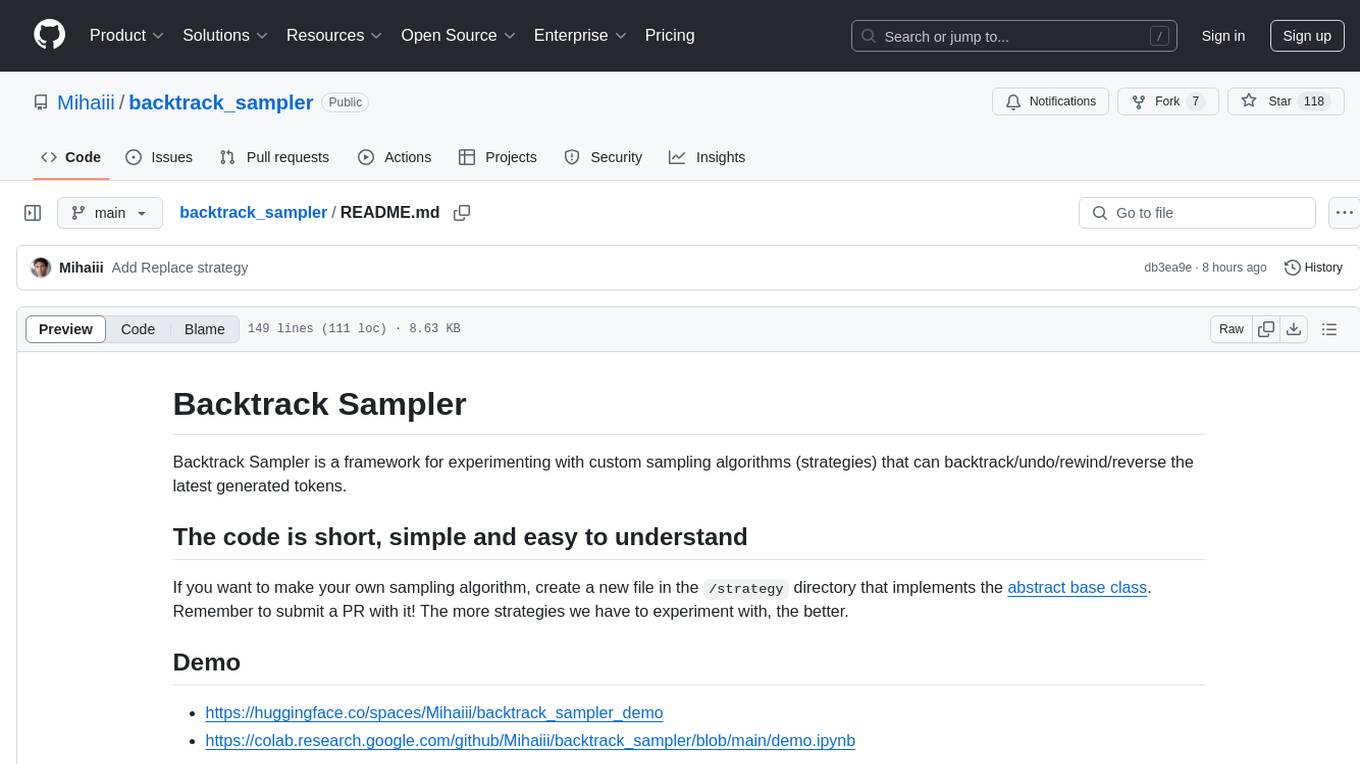
backtrack_sampler
Backtrack Sampler is a framework for experimenting with custom sampling algorithms that can backtrack the latest generated tokens. It provides a simple and easy-to-understand codebase for creating new sampling strategies. Users can implement their own strategies by creating new files in the `/strategy` directory. The repo includes examples for usage with llama.cpp and transformers, showcasing different strategies like Creative Writing, Anti-slop, Debug, Human Guidance, Adaptive Temperature, and Replace. The goal is to encourage experimentation and customization of backtracking algorithms for language models.
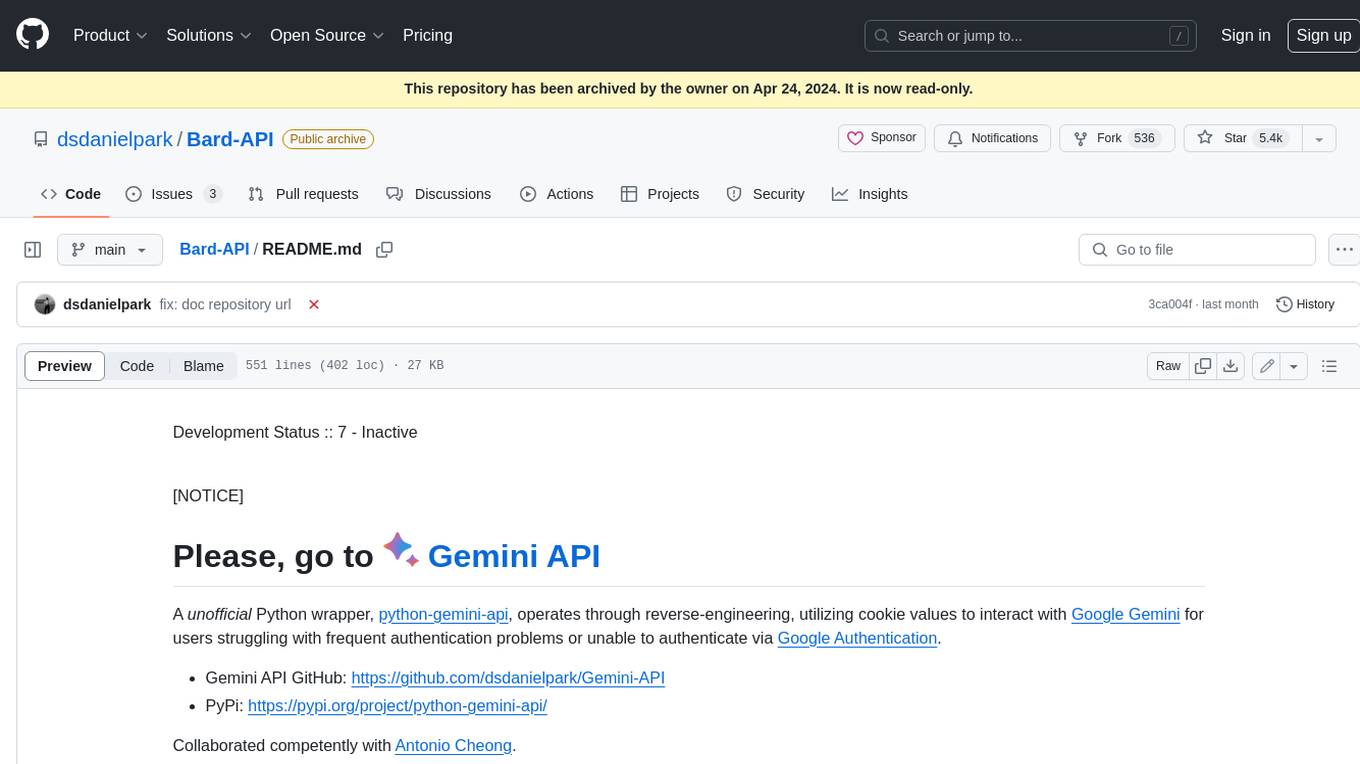
Bard-API
The Bard API is a Python package that returns responses from Google Bard through the value of a cookie. It is an unofficial API that operates through reverse-engineering, utilizing cookie values to interact with Google Bard for users struggling with frequent authentication problems or unable to authenticate via Google Authentication. The Bard API is not a free service, but rather a tool provided to assist developers with testing certain functionalities due to the delayed development and release of Google Bard's API. It has been designed with a lightweight structure that can easily adapt to the emergence of an official API. Therefore, using it for any other purposes is strongly discouraged. If you have access to a reliable official PaLM-2 API or Google Generative AI API, replace the provided response with the corresponding official code. Check out https://github.com/dsdanielpark/Bard-API/issues/262.

LLMStack
LLMStack is a no-code platform for building generative AI agents, workflows, and chatbots. It allows users to connect their own data, internal tools, and GPT-powered models without any coding experience. LLMStack can be deployed to the cloud or on-premise and can be accessed via HTTP API or triggered from Slack or Discord.

jupyter-ai
Jupyter AI connects generative AI with Jupyter notebooks. It provides a user-friendly and powerful way to explore generative AI models in notebooks and improve your productivity in JupyterLab and the Jupyter Notebook. Specifically, Jupyter AI offers: * An `%%ai` magic that turns the Jupyter notebook into a reproducible generative AI playground. This works anywhere the IPython kernel runs (JupyterLab, Jupyter Notebook, Google Colab, Kaggle, VSCode, etc.). * A native chat UI in JupyterLab that enables you to work with generative AI as a conversational assistant. * Support for a wide range of generative model providers, including AI21, Anthropic, AWS, Cohere, Gemini, Hugging Face, NVIDIA, and OpenAI. * Local model support through GPT4All, enabling use of generative AI models on consumer grade machines with ease and privacy.
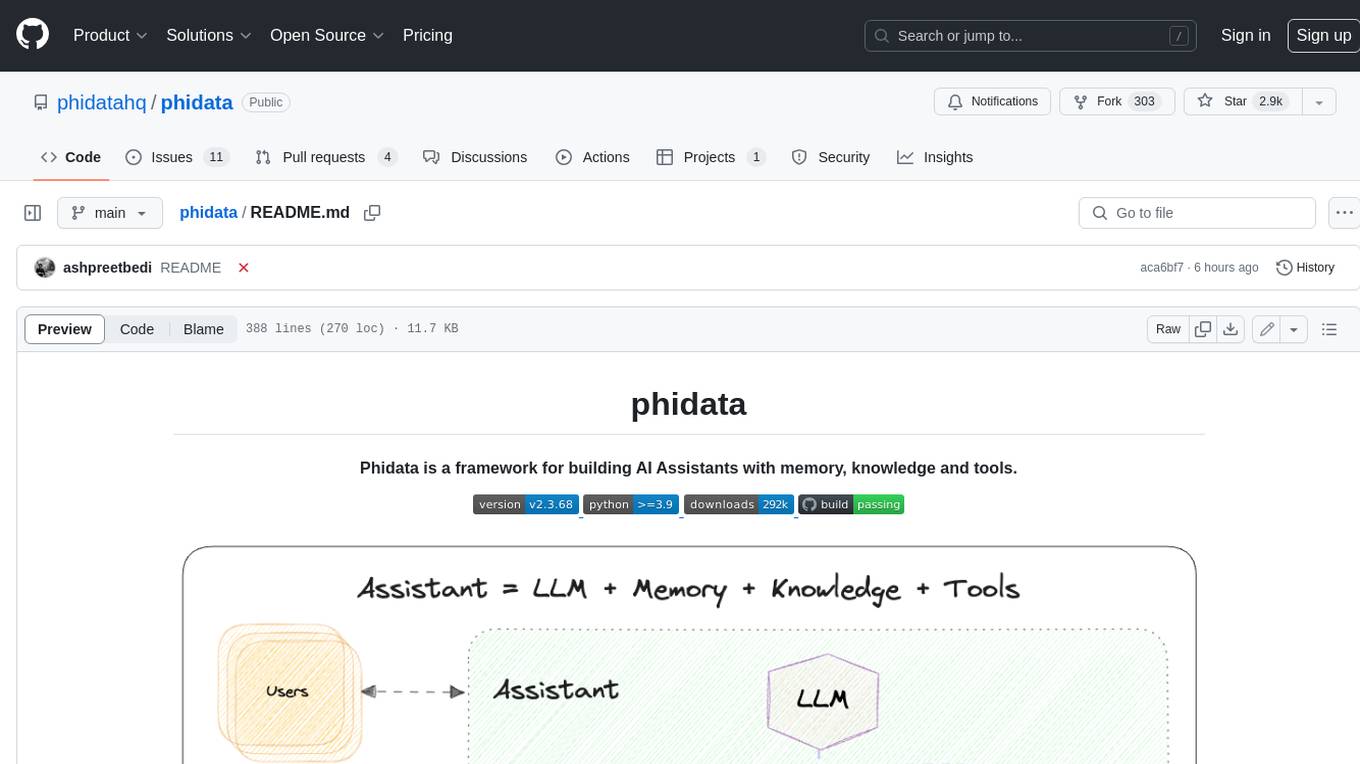
phidata
Phidata is a framework for building AI Assistants with memory, knowledge, and tools. It enables LLMs to have long-term conversations by storing chat history in a database, provides them with business context by storing information in a vector database, and enables them to take actions like pulling data from an API, sending emails, or querying a database. Memory and knowledge make LLMs smarter, while tools make them autonomous.
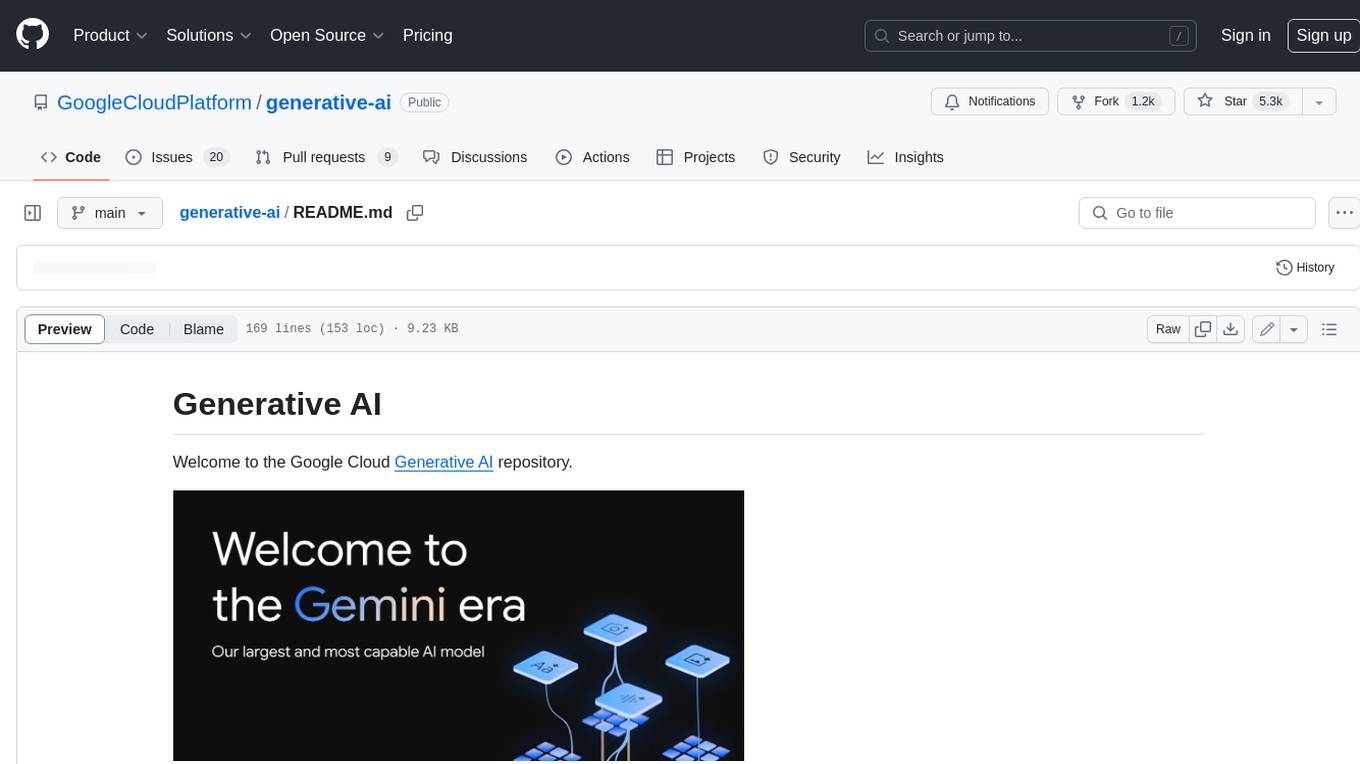
generative-ai
This repository contains notebooks, code samples, sample apps, and other resources that demonstrate how to use, develop and manage generative AI workflows using Generative AI on Google Cloud, powered by Vertex AI. For more Vertex AI samples, please visit the Vertex AI samples Github repository.
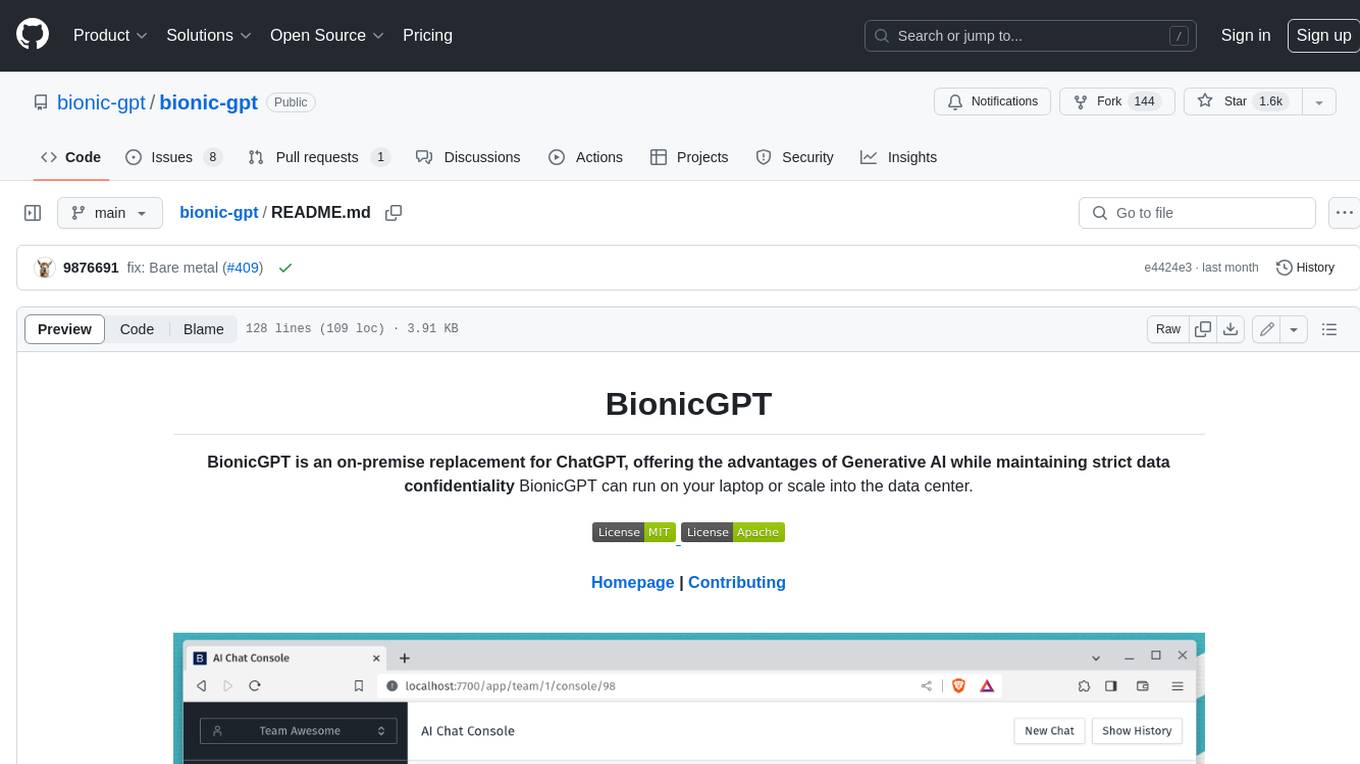
bionic-gpt
BionicGPT is an on-premise replacement for ChatGPT, offering the advantages of Generative AI while maintaining strict data confidentiality. BionicGPT can run on your laptop or scale into the data center.
For similar jobs

ChatFAQ
ChatFAQ is an open-source comprehensive platform for creating a wide variety of chatbots: generic ones, business-trained, or even capable of redirecting requests to human operators. It includes a specialized NLP/NLG engine based on a RAG architecture and customized chat widgets, ensuring a tailored experience for users and avoiding vendor lock-in.

agentcloud
AgentCloud is an open-source platform that enables companies to build and deploy private LLM chat apps, empowering teams to securely interact with their data. It comprises three main components: Agent Backend, Webapp, and Vector Proxy. To run this project locally, clone the repository, install Docker, and start the services. The project is licensed under the GNU Affero General Public License, version 3 only. Contributions and feedback are welcome from the community.

anything-llm
AnythingLLM is a full-stack application that enables you to turn any document, resource, or piece of content into context that any LLM can use as references during chatting. This application allows you to pick and choose which LLM or Vector Database you want to use as well as supporting multi-user management and permissions.

ai-guide
This guide is dedicated to Large Language Models (LLMs) that you can run on your home computer. It assumes your PC is a lower-end, non-gaming setup.

Magick
Magick is a groundbreaking visual AIDE (Artificial Intelligence Development Environment) for no-code data pipelines and multimodal agents. Magick can connect to other services and comes with nodes and templates well-suited for intelligent agents, chatbots, complex reasoning systems and realistic characters.

glide
Glide is a cloud-native LLM gateway that provides a unified REST API for accessing various large language models (LLMs) from different providers. It handles LLMOps tasks such as model failover, caching, key management, and more, making it easy to integrate LLMs into applications. Glide supports popular LLM providers like OpenAI, Anthropic, Azure OpenAI, AWS Bedrock (Titan), Cohere, Google Gemini, OctoML, and Ollama. It offers high availability, performance, and observability, and provides SDKs for Python and NodeJS to simplify integration.

chatbot-ui
Chatbot UI is an open-source AI chat app that allows users to create and deploy their own AI chatbots. It is easy to use and can be customized to fit any need. Chatbot UI is perfect for businesses, developers, and anyone who wants to create a chatbot.

onnxruntime-genai
ONNX Runtime Generative AI is a library that provides the generative AI loop for ONNX models, including inference with ONNX Runtime, logits processing, search and sampling, and KV cache management. Users can call a high level `generate()` method, or run each iteration of the model in a loop. It supports greedy/beam search and TopP, TopK sampling to generate token sequences, has built in logits processing like repetition penalties, and allows for easy custom scoring.



